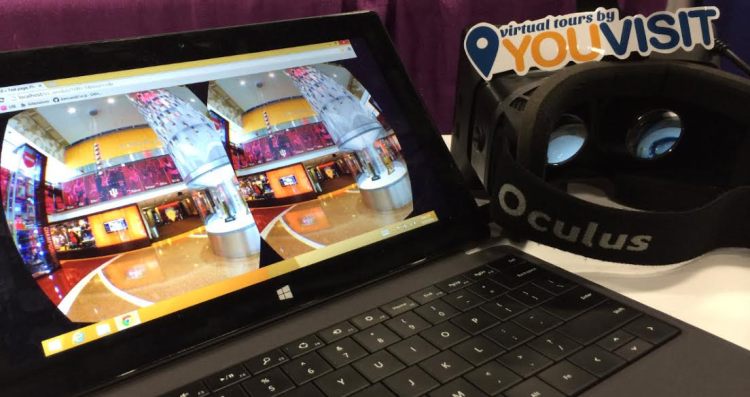When I was a young prospective student looking at schools, I did my search through the College Board website. It gave me basic information: ranking among other schools, programs, student body demographics, and so on. When I narrowed it down to one college that I was really psyched about, I opened a new tab in my browser and booked a plane ticket for the following evening. Since then, airline prices have skyrocketed, making it more difficult to see prospective schools in person.
Inspired by their own difficulty visiting colleges in the U.S., three former Brandeis University international students decided to create a website for virtual-college tours so students could check out schools without ever leaving their homes. The entirely self-funded company, YouVisit, launched in 2009. It started out as a virtual 2D web tour, but now the company is creating 3D tours compatible with dev kits of Oculus VR’s Rift headset.
To pull off these 3D tours, YouVisit goes to a college campus and photographs various locations using a 3D panoramic camera. Integrating the images into a format for Oculus is fairly simple. “We can turn around a tour in a few weeks time,” says cofounder and chief technology officer Taher Baderkhan.
Keep in mind, this application is unglamorous. When I put on the headset, I was instantly transported to a football stadium on one of YouVisit’s campuses, but the band, cheerleaders, and fans in the stands were all frozen in time as I looked around the panorama. This has no movement functionality. Also, the current Oculus dev kit operates at a much lower resolution than the upcoming consumer version, which means YouVisit’s images are not as crisp as they could be — making the experience feel more like a video game than real life. Still, standing on that lush, green football field, I felt like I had been taken somewhere else.
And it could be another opportunity to expand virtual reality beyond gaming and porn.
Right now, the company hosts over 1,000 tours from schools in North America, South America, Europe, Asia, and Africa. Plus, its client list is expanding to include Fortune 500 companies, like Hewlett-Packard. Why would Hewlett-Packard want to buy a virtual reality tour, you ask? To enable clients all over the world to view its factories without having to fly them out there. If the company wanted to, it could easily offer tours of multiple facilities. YouVisit is also working with Central Park in New York City to create virtual tours for people thinking of visiting the park and as a tool for people who have already visited to recreate the experience for friends.
If you have an Oculus headset, you can go to YouVisit’s website and view the 3D tours. Otherwise, expect to see YouVisit setups at college fairs.
YouVisit’s 3D tours launched earlier this year, and already the company has bigger plans for the platform. “Now we’re interested in making the experience richer,” says Baderkhan. “You look up in the sky and you can see menus popping out of nowhere. Menus that with your hand you can grab and pull it.” The firm hopes to bring in all the other functionality of the 2D tours and then some, like being able to grab a 3D menu in the corner of the screen and pull it down, as well as an interactive tour guide.
“This is a new space and a new arena. Usually in development if you have a problem you can go online and research it. But here there are no standards here,” Baderkhan said. “We’re doing cool development and trying to come up with standards and see what others are coming up with — but they’re keeping that to themselves.”
Future plans for the service may include live streaming. “I don’t think anyone is doing anything with streaming yet,” says Baderkhan. Streaming 3D would make a lot of sense for their business and is in a way a natural extension of their platform. But it might not be that easy, as streaming video takes up a lot of power and internet bandwidth. And Baderkhan thinks that audio would be difficult, too.
But that’s what’s so powerful about Oculus’ technology — the possibility.
For now, the technology is rough around the edges. The company is currently waiting to receive the new version of the Oculus dev kit, which YouVisit says will have better resolution and make up for latency issues. But, I can’t help but think that even with the technological glitches, putting on that headset instantly recaptured that feeling of empowerment of standing on a college quad and making one of the most important decisions of my 18 year-old life.


